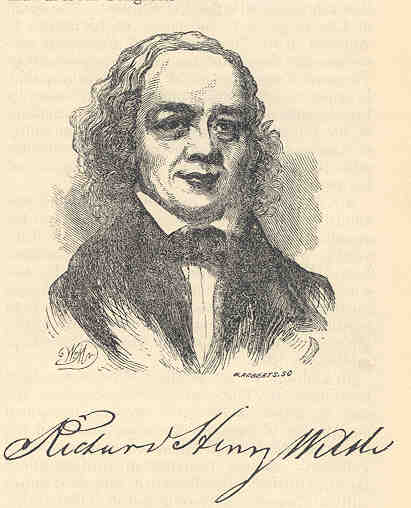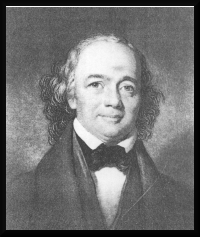|
Richard Henry Wilde
Evert A. & George L. Duyckinck, The Cyclopedia
of American Literature 805 Richard Henry Wilde was born in Dublin, Ireland on September 24,1789 and came to America at age eight. Wilde, his father deceased soon after their arrival, and still a young man, moved to Augusta, Georgia to take advantage of a menial job offered him as a clerk in a dry-goods store. When he established himself he convinced his mother to move to Georgia and to open a business of their own. Wilde worked in the business by day and endeavored to educate himself by his own doing at night. At age eighteen he began his study of law with Joseph Hutchinson. Two years after beginning his studies, at age twenty, in 1809, he was admitted to practice law and began his legal practice in Augusta. Wilde would go on to serve as the first Attorney-General of Georgia (1811-1813) and as a member of Congress. From 1815 to 1835, Wilde served a number of terms in Congress but was defeated in several reelection efforts. From 1835 to 1840 he studied abroad, chiefly Italian literature, focusing on Dane and Tasso. In 1843 he moved to New Orleans to establish a legal practice and continue his literary pursuits. He became a professor of constitutional law at the law department at the University of Louisiana at New Orleans. He died of yellow fever in New Orleans on September 10, 1847. After several removals, he now rests in burial at the City Cemetery, Augusta, Georgia. Of his physical statute and demeanor, Mildred Lewis Rutherford noted that:
[Source: Mildred Lewis Rutherford, The South in History and Literature 121 (Atlanta: Franklin-Turner, 1907)(1906)] Edgar Allen Poe in A Chapter on Autography (II), Graham's Magazine, December, 1841 comments on Wilde reputation as a poet:
W.P. Trent notes that Wilde "made a reputation as a poet by his fugitive poems, were were widely copied in the newspapers. Chief among these was 'My Life is like the Summer Rose,' which was at first intended to appear in a narrative poem dealing with events in Florida The lines appeared in 1815, and having later been translated into Greek were palmed off on many persons as a translation from Alcaeus. . . . Other verses were contribution by Wilde to the magazines of the day, particularly translations from the Romance literatures. His only book was 'Conjectures concerning the Love, Madness, and Imprisonment of Torquato Tasso' (1842). He left many manuscripts, and in 1867 his son edited a narrative poem, 'Hesperia,' which has attracted but little notice." [W.P. Trent, Southern Writers: Selections in Prose and Verse 118-119 (New York: MacMillan Company, 1905)]
My
Life is Like the Summer Rose [Stanzas] [Stanzas] [To the Mocking-Bird] [To the Mocking-Bird] [A Farewell to America] [A Farewell to America] Poems Poetry Richard Henry Wilde, Hesperia, a Poem (Boston: Ticknor and Fields, 1867)(William Cumming Wilde, ed.)(William Cumming Wilde was his son) Writings Richard Henry Wilde, Conjectures and Researches Concerning the Love, Madness, and Imprisonment of Torquato Tasso (New York: Alexander V. Blake, 1842) [online text] Bibliography Edward L. Tucker, Richard Henry Wilde: His Life and Selected Poems (Athens: University of Georgia Press, 1966) Charles C. Jones, Jr., The Life, Literary Labors and Neglected Grave of Richard Henry Wilde (Augusta, Georgia: 1885)(21 pgs.) Bibliography: Articles & Encyclopedias Douglas C. Gronberg, The Problem of the Pseudonym and the Fictional Editor in Richard Henry Wilde's Hesperia: A Poem, 66 (4) Georgia Historical Quarterly 549-554 (1982) Edward L. Tucker, "Richard Henry Wilde," in Eric L. Haralson (ed.), Encyclopedia of American Poetry: The Nineteenth Century (Chicago: Fitzroy Dearborn, 1998) Nathalia Wright, The Italian Son of Richard Henry Wilde: A Sequel, 53 (2) Georgia Historical Quarterly 201-204 (1969) Research Resources Narrative
of the Translation of Richard Henry Wilde's Papers of Richard Henry Wilde Papers of Richard Henry Wilde |

